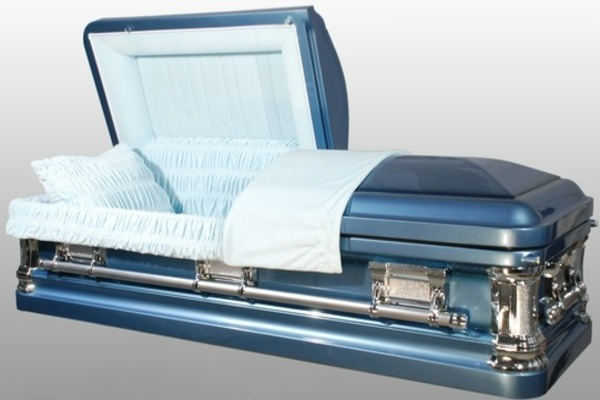
In times of grief, funeral services provide solace and a way to honor the life of a loved one. For many, faith plays a significant role in this process, offering comfort and guidance during a difficult time. Sameday Casket specializes in providing funeral caskets or Religious caskets for sale in Los Angeles, serving as a tangible expression of faith that reflects the deceased’s beliefs and values.
The Symbolism of Caskets in Religious Contexts
Caskets are often seen as sacred vessels that house the deceased, providing dignity and respect in their final moments. This practice is deeply rooted in various religious traditions, where the choice of casket can symbolize beliefs about life, death, and the afterlife. For instance:-
- Christianity: In many Christian funerals, caskets are typically made from wood or metal, symbolizing strength and permanence. The choice often reflects the deceased’s faith and personality, with some families opting for elaborately designed caskets adorned with religious symbols such as crosses or angels.
- Islam: Islamic funerals usually do not involve caskets. Instead, the body is wrapped in a simple shroud and placed directly into the ground. This practice emphasizes humility and equality in death, aligning with Islamic teachings about the transient nature of life.
- Hinduism: Hindu funerals often involve cremation, where an open casket may be used during the ceremony for family members to pay their last respects. The casket serves as a temporary vessel before cremation, reflecting the belief in the cycle of life and rebirth.
An Overview of Religious Caskets for Different Spiritual Practices
When selecting a religious casket, understanding the customs and burial practices of different faiths is essential. Different religions often have distinct requirements for the type of casket used, the materials chosen, and the symbols depicted on the casket. Let’s explore how different faiths approach this important choice.
- Christian Caskets
Christian funerals often feature caskets that incorporate symbols of the faith, such as crosses, angels, or depictions of the Resurrection. Christian caskets can be simple or elaborate, depending on the denomination and the wishes of the deceased’s family. Catholic caskets may include symbols like the Sacred Heart, while Protestant funerals might focus more on simplicity, with wooden caskets being the preferred option for many.
- Jewish Caskets
In Jewish tradition, simplicity and modesty are key principles when it comes to funeral arrangements. Jewish caskets are usually made from plain, natural wood, often without handles, to align with the values of humility and equality in death. The casket is typically unadorned, emphasizing the belief in the equality of all souls before God. Some caskets may feature the Star of David or other traditional symbols, but they remain relatively simple in design.
- Muslim Burial Practices
Islamic burial customs dictate that the body be placed in a simple wooden casket, as elaborate or decorative coffins are discouraged. The casket should ideally be rectangular and without embellishments, to honor the belief in the simplicity of death and the equality of all individuals in the eyes of God.
- Hindu Cremation Urns
Hindu funerals often involve cremation rather than burial, and as such, urns play an important role in the final rites. These urns may be made of materials such as brass, clay, or wood and can be adorned with sacred symbols like Om, lotus flowers, or depictions of deities. The urn serves as a vessel for the deceased’s ashes, which are often scattered in holy rivers or at specific sacred sites.
- Buddhist Memorial Options
Buddhist funerals vary by region, but in many traditions, the casket is simple and unadorned. The focus is on honoring the deceased’s spiritual journey, with the understanding that the body is a temporary vessel. Caskets may feature Buddhist symbols such as the lotus flower, which represents enlightenment, or the Dharma wheel, signifying the teachings of the Buddha.
- Interfaith Considerations
For families with interfaith backgrounds or those who wish to combine elements from different religious traditions, a custom casket may be created to reflect the diversity of beliefs. These caskets might incorporate symbols or design elements from multiple faiths, ensuring that the deceased is honored in a way that resonates with their personal and familial spiritual practices.
Cultural Significance and Personalization
The choice of casket can also reflect cultural practices and personal preferences. Families may select materials based on their cultural significance or environmental considerations:-
- Wooden Caskets: Often chosen for their natural appearance, wooden caskets symbolize a connection to nature and the cycle of life. They are commonly used in many cultures as they resonate with traditional burial practices4.
- Biodegradable Options: With growing environmental awareness, biodegradable caskets are becoming popular among those who wish to minimize their ecological footprint even in death. These options align with certain religious beliefs that emphasize respect for nature
Conclusion
In conclusion, religious caskets play a vital role in honoring faith within funeral services. They are not merely containers for the deceased but are imbued with deep symbolism that reflects cultural values, personal preferences, and religious beliefs. By understanding these aspects, families can make informed decisions that honor their loved ones’ lives while respecting their faith traditions. As funeral services continue to evolve, recognizing the importance of these sacred vessels remains essential in providing meaningful farewells that resonate with both personal loss and spiritual significance.
